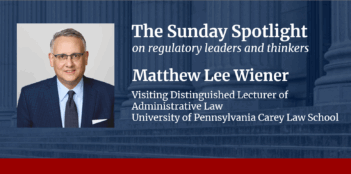
A federal judge strikes a blow to two states’ Medicaid work requirements.
Amid reports estimating that over 18,000 Arkansan Medicaid beneficiaries lost health care coverage in 2018 and that 136,000 Kentuckian Medicaid beneficiaries could lose coverage as soon as April 1, 2019, Judge James E. Boasberg of the U.S. District Court for the District of Columbia sent a strong message to the Trump Administration: The approval of these states’ Medicaid work requirements “cannot stand.”
With the support of the Centers for Medicare and Medicaid Services (CMS)—which operates the joint federal-state Medicaid program—Arkansas implemented an 80-hour-per-month work requirement for its non-disabled, non-elderly Medicaid beneficiaries, and Kentucky was ready to do the same.
But Judge Boasberg found that CMS failed to adequately consider the core objectives of Medicaid when approving the states’ work requirement programs and that the Secretary for the U.S. Department of Health and Human Services (HHS), Alex Azar, acted “arbitrarily and capriciously” in allowing them to move forward.
Operating under the federal “Section 1115” Medicaid waiver program, CMS gave Arkansas the green light to require non-elderly, non-disabled Medicaid beneficiaries to work or participate in “community engagement” activities for at least 80 hours per month.
Because Judge Boasberg found that CMS and HHS did not adequately consider the potential coverage loss stemming from work requirements, the public may have had little way of knowing whether such work requirements would have been effective at achieving what they were intended to do—improve health and employment outcomes. Plaintiffs in the Kentucky litigation identified CMS’s methodology as conflicting with a core purpose of the Medicaid program: to provide health care to the most vulnerable, who cannot afford it or need it the most.
Notwithstanding the controversial nature of Medicaid work requirements, critics argued that CMS was circumventing an HHS regulation that evaluates proposed state programs and ensures that they are supported by appropriate data.
With at least 13 other states applying for, or successfully obtaining, federal waivers that would allow them to impose work requirements on Medicaid recipients, support for these requirements appears to be growing. Proponents find that Medicaid work requirements make sense for beneficiaries who are able to work. Not only should these beneficiaries experience the “dignity of work,” supporters argue, but their unemployment is also a burden on the American taxpayer.
Critics of Medicaid work requirements, however, argue that no evidence supports the notion that work requirements lead to purportedly better health and employment outcomes for non-elderly, non-disabled Medicaid beneficiaries. Moreover, they argue that most Medicaid beneficiaries are already working and fear that many beneficiaries would lose coverage based on their inability to meet state reporting requirements, not their lack of employment.
Critics of Medicaid work requirements have also admonished the Trump Administration for easing the process by which state applications for Medicaid work requirements are evaluated, arguing that such actions are contrary to an HHS regulation governing the Medicaid waiver process.
The Social Security Act grants HHS the authority to waive Medicaid provisions that are otherwise compulsory for states. Work requirements are just one form these waivers can take.
HHS issued a regulation in 2012 governing how CMS evaluates states’ waiver applications. The regulation clarified that for states’ applications to be deemed complete, they must provide an “estimate of the expected increase or decrease in enrollment, and in annual aggregate expenditures.”
In Arkansas’s original application for a waiver that would allow it to impose work requirements, the state predicted that about 272,000 individuals would enroll in the new “Arkansas Works” program by 2021. In a brief before Judge Boasberg, Arkansas argued that it did not predict any coverage loss, and that any potential coverage loss would be outweighed by the “health benefits of community engagement.”
In addition, a CMS spokesperson reportedly stated that the 2012 regulation does “not require that states provide precise numerical estimates of coverage impacts, which are difficult to predict.”
The 2012 regulation also establishes evaluation requirements, which have historically called for states to include in their applications certain quantitative research methods involving “the empirical investigation of the impact of key programmatic features of the demonstration.” For Medicaid work requirements, critics contend that such research should include data on the efficacy of work requirements in improving health and employment outcomes for those affected.
But despite the arguments from critics about coverage empirics, Judge Boasberg found that although “producing an empirical prediction of coverage loss does not seem like too much to ask of the expert agency tasked with supervising Medicaid programs in all 50 states, the Court does not need to decide whether such an estimate is required.” Moving forward, it remains unclear whether CMS or HHS will be responsible for providing empirics on coverage loss for Medicaid work requirement waivers, or whether it will be able to rely on states’ figures.
But other, more recent changes to the waiver approval process may also be allowing greater flexibility in states’ applications.
Federal law requires any waiver project to further the objectives of the Medicaid program. In November 2017, CMS published revised criteria for evaluating whether states’ waiver applications would indeed further Medicaid’s objectives. Notably absent from these criteria was any acknowledgment of the goal of expanding Medicaid coverage, suggesting that state measures that ultimately lower Medicaid enrollment will not necessarily be viewed by CMS as conflicting with the Medicaid statute.
Then, in January 2018, CMS issued specific guidance about how states could obtain waivers to impose work requirements. In the guidance, CMS expressed support for state waivers seeking to institute work requirements, stating that such programs could “be designed to help individuals and families rise out of poverty and attain independence.”
CMS also suggests that work requirements further the overarching goals of Medicaid by promoting health, stating that “a growing body of evidence suggests that targeting certain health determinants, including productive work and community engagement, may improve health outcomes.”
But Judge Boasberg disagreed with CMS’s interpretation of the Medicaid program’s core objectives. Notably, he rejected the proposition that improving beneficiary health by promoting financial independence was a legitimate objective, emphasizing instead the primary goal of furnishing medical assistance to qualifying persons.
CMS Administrator Seema Verma has defended the agency, saying work requirements “are not some subversive attempt to just kick people off of Medicaid. Instead, their aim is to put beneficiaries in control with the right incentives to live healthier independent lives.”
Even in the face of an adverse decision in the U.S. District Court for the District of Columbia, the current CMS landscape suggests that more states will obtain Section 1115 waivers. In fact, just two days after Judge Boasberg’s decision, CMS approved Utah’s plan for Medicaid work requirements. But we can also expect to see more lawsuits as CMS approves more states’ work requirement waivers, suggesting that the debate is far from over.



